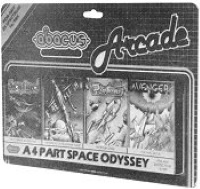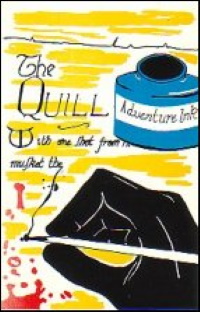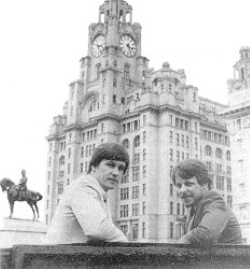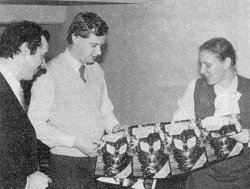

Details have just been arranged for Alison Maguire, Software Manager for Sinclair, to be interviewed by three CRASH reviewers and readers. By the time you read this, the interview will have taken place on the 9th February at Sinclair’s London Offices. The interview will be published in next month’s CRASH.

The multi-digited gamesters Abacus, have just released a four game pack under the name Space Odyssey. The four games are Sentinel, Fireflash, Avenger and Proteus, and they all form a continuing arcade story. Avenger sold 40,000 copies, while Sentinel remained in Smith’s top ten for months. Fireflash received a rave CRASH review in last month’s issue. Author Kevin Flynn has recently completed Proteus, which unfortunately we can’t review until next month due to pressures of space. Abacus are still selling the game separately at £5.95 each but you can buy all four games in the ‘arcade pack’ for only £14.95 — a saving of almost £9.

Gilsoft, whose adventure writing utility The Quill has been responsible for helping many authors produce Adventure Games across a range of software houses in recent months, have announced a series of Adventure Games for the 48K Spectrum.
The series is called The Gold Collection and contains eight titles. One is yet to be announced but the others are Magic Castle and Diamond Trail, which have been out for some time (and were the first to be written with The Quill), Africa Gardens, The Adventures of Barsak the Dwarf, Spy Plane, Devil’s Island and Mindbender.
Africa Gardens by Tom Davies takes its name from the hotel featured in the game and is set at the turn of the century. It has graphics and displays The Quill’s versatility with UDG’s and block graphics. Barsak the Dwarf is written by P & V Napolitano. You must help Barsak collect nine treasures of his forefathers and ‘it’ is set in a mythological underworld. Spy Plane by D. Brammer, has an unusual setting for an adventure in as much as the game takes place in the plane and over the locations. You’re flying over locations set in the Arzelan sea, gaining military intelligence. It should be realistic as the author is a pilot and used to be in the RAF. Devil’s Island by Colin Smith poses you the problem of escaping from the infamous French island prison. You must face the prison guards, the jungle and unfriendly natives, find a boat and escape to the mainland. Mindbender by B. Jenkinson has you suddenly transported by aliens using some mysterious ray to their underground base. You have the mental power to resist and escape, and your task is to locate the source of the ray and destroy it. This game starts off, apparently, with a description which includes a desk with a Quill sitting on it!
All titles in the Gold Collection will be available individually, priced £5.95 each and Gilsoft hope to have them ready for release sometime in February this month in their own distinctive packaging.
Shops are normally too busy to be able to demonstrate games to their customers, but software house, Micromega, are making attempts to alter that. They have recently set up demonstration stands in two of the larger Boots stores where there are large computer sections.
The demonstrations have taken place at Boots’ branches in Portsmouth and Slough, and involved two members of staff with six Spectrums and screens. A spokesperson for Micromega told us that the idea had proved popular, and that in discussions with Boots there had been an informal agreement to expand the service to other stores across the country.
Boots carry all four Micromega products, Haunted Hedges, Luna Crabs, Starclash and, of course, the fabulous Deathchase. Micromega see the demonstration stands as a part of company support for their games as they do no mail order, only supplying retail outlets directly and through distributors like Websters. The call for games has been enormous. Only the Thursday before Christmas Websters asked for several thousand copies of Deathchase and Micromega made a super human effort and was able to deliver them before lunch the next day.
The next game from the company, as we reported in last month’s issue, is another Derek Brewster title, which he gave a working title of Invasion 2000. At the moment Micromega haven’t decided what to call it, but they told us that it is going to be a big seller.

Reclusive programmer Matthew Smith makes a rare appearance for the CRASH camera between manically mining.
After a visit to deepest Woolton (Liverpool) we can report that the errant Jet Set Willy is alive and well, if a trifle late in emerging from that Surbiton Mine of his. Author Matthew Smith told us that the main reason for the delay was due to the builders who have not finished work on decoration of Willy’s enormous new mansion. The size of the house is a rather daunting, as it contains 64 rooms, and is therefore some three times bigger than the mines below! Each room is in an indescribable mess because when Willy’s new found fairweather friends have a party, do they have a party!
Alan Maton of Software Projects had hoped the game would be released before Christmas and planned accordingly. But the sheer size of the game, the amount of animation in it, and the fact that it is intended to be a big improvement on Manic Miner has caused Matthew the kind of headaches that Willy himself would appreciate. Another week should see the program work finished, we were told. The inserts are already printed and waiting — so, come on Matthew, get off your Eugene’s Lair and back to the surface!
Quicksilva have just launched a club members only magazine called The Game Lords Megazine. It’s eight pages of game hints, news on the company’s products, a chart and competitions. There’s also a report on the Faluvian Empire, which someone at Quicksilva had threatened to write a novel about. I hope this isn’t a cheapskate way out of writing the real thing — don’t they know how many Spectrum owners are saving up to buy the Chronicles of the Faluvian Empire when the trilogy of novels are released? Whether you’re an Xxkraan Raider or a mere earthbound alien-zapper, details on the club are available from Quicksilva.

Terry Grant — Rabbit’s software director.
Software house Rabbit have recently moved from their premises in Harrow to a new home in Wealdstone — in fact it’s called ‘The Warren’ and is a suitable name as Roland Rabbit appears to be breeding games faster than a hamster fed on oysters. At the same time 18 year old Terry Grant has been promoted to the post of Software Director. Terry has worked at Rabbit for some time, and has been responsible for the production of 15 games now. Rabbit consider the concept of a software director to be a new one, and they feel there is a need for such a job. Terry, who studied computer science before joining Rabbit, feels that a detached view of a game will often produce more realistic results and that it’s very easy for a programmer to get too far inside the game. His role is to ensure that Rabbit games have consistently high levels of playability and will maintain the interest of players for longer periods.
In last month’s joystick article, we reported on a programmable joystick interface called Comcon and made by Frel Ltd. CRASH is always interested in any small company making a debut with an item of interest to games players, and it’s doubly pleasant when the company turns out to be a close neighbour in little old Ludlow itself. A Frel spokesperson has now informed us that production models of the interface will soon be available. It features a matrix board representing the Spectrum keyboard, and is said to be the simplest method of programming a universal joystick so far. Anyone interested in further details should write to Frel Ltd. 1 Hockey’s Mill, Temeside, Ludlow, Shropshire SY8 1PD.

Arcadians Mark Butler & David Lawson.
Known colloquially as the ‘Glass Tower’ in micro-software conscious Liverpool, Imagine’s new headquarters office in Sir Thomas Street is actually a beautifully renovated four storey building of red brick. Appropriately enough, it is situated only a short distance from the site of where Liverpool’s famous Cavern Club used to be. Appropriate because there are some uncanny parallels between Imagine-ation and Beatlemania.
When Brian Epstein discovered the Beatles playing in the Cavern they were unknowns. Epstein was an accountant running a record business. Imagine’s Director of Operations is Bruce Everiss. In the late 70s Bruce Everiss started up a unique shop called Micro Digital, one of the first shops in the UK to sell home computers over the counter to an unsuspecting populace. The shop was a great success, so much so that Mr. Everiss attracted the attention of the high street giants, and eventually the business was sold to Laskys. Like Brian Epstein’s record shop in the early 60’s, Micro Digital was a hot bed of young talent — in this case not musicians but software enthusiasts. Among the employees were names later to emerge like David Lawson and Mark Butler. After Micro Digital went to Laskys the various enthusiasts merged their energies into what became Bug-Byte, but with so many young, go-ahead talents involved it was not surprising that they should want to go their separate ways. Lawson and Butler founded Imagine and released Lawson’s program Arcadia.
The infant company was a phenomenal success and within months had earned its first six million pounds selling Spectrum games. With growth had to come planning so Lawson and Butler did the obvious and asked Bruce Everiss to come and run the company.
Today, just a year after it started Imagine is a company with over 100 employees, a head office block, two warehouses and a Contract Programming Building. The founders are worth an estimated £30 million and the management live and work in a fine style.

CRASH editor Roger Kean, Imagine’s Director of Operations, Bruce Everiss, and PA, Jenny.
Bruce Everiss showed us around the main office block. The company’s affairs are run from here and it also includes the sales team and games programming department. An area for six programmers is set out on a lavish scale, backed up by a computing power which is quite staggering, and a Technical Support Area which can provide the programmers with whatever resources they require. As we walked about Ian Weatherburn, author of Imagine’s latest game Alchemist, was already at work at one of the desks on another project. A lot of the other programmers have been ‘locked away’ to work on Bandersnatch which should be ready sometime around May.
When the game is finished it gets ‘play-tested’ by a panel of 20 local games players which Imagine uses. Their recommendations will then be used to make alterations to the game before it can be released.
From the quiet, carpeted splendour of the main office, Bruce Everiss explained that Imagine have had to employ a lot of top management experts in recent months to guide the company as it expands. Between these new managers there are a lot of degrees in science, psychology and business management. They know an awful lot about computers and software, but very little about games. To fill in this gap in their experience it seems CRASH Magazine is being used as a ‘training manual’!
Just as Epstein and the Beatles created an awareness in Liverpool and then throughout the world about popular British music, so the guiding hand of Bruce Everiss and Imagine have created an awareness first in Liverpool and now throughout the world about British games software.